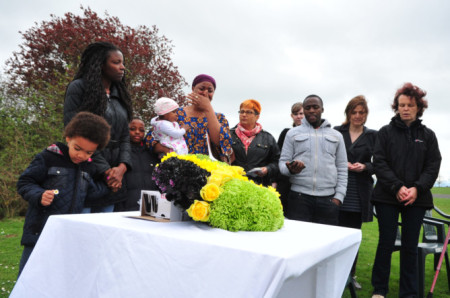
Another human rights group has raised concerns about the regime at one of Britain’s most infamous immigration removal centres.
Natasha Walter, director of Women for Refugee Women, a London headquartered organisation set up to ensure that women and children seeking asylum in the UK are treated with justice and dignity, expressed her concern after a UN human rights investigator revealed she was denied access to the controversial Yarl’s Wood Immigration Removal Centre near Bedford.
After being refused access, Rashida Manjoo, the UN Special Rapporteur on Violence against Women said: “I regret that, despite my repeated requests, a visit to Yarl’s Wood [IRC] was not facilitated by the government and that my access to the centre was denied when I tried to visit it independently.
“The State has a responsibility to act with due diligence to eliminate all forms of violence against women and girls, and it is imperative that the best interests of all women and girls should guide the response of the UK government.”
According to Ms Manjoo, she was given the go-ahead for the visit by the Prisons Inspectorate and was accompanied by one of their staff. She said she was told the decision to deny her access had come from the “highest levels” of the Home Office.
Expressing “deep concern” at not being allowed in to verify alleged human rights violations of the women detainees, Ms Manjoo said: “if there was nothing to hide I should have been given access,” adding: “It’s part of the terms of references when mandate-holders are invited to a country that they should be given unrestricted access and this didn’t happen.”
Natasha Walter said: “We share Rashida’s disappointment that she was unable to visit Yarl’s Wood [IRC] for women because we believe she should see at first hand the effect of the government’s immigration policies on vulnerable women who seek asylum in the UK.
“In 2012, nearly 2,000 women who had sought asylum in the UK were held in detention by the UK government.”
The controversy comes only a fortnight after Christine Case, a 40-year-old Jamaican detainee at Yarl’s Wood, died after suffering an alleged heart attack, having complained of chest pain and being offered paracetamol.
In January, Women for Refugee Women published a report collating the experiences of female failed asylum-seekers who had been held at removal centres, mainly at Yarl’s Wood. Forty of the 46 women interviewed said they had been guarded by male staff and 70 per cent of these said this made them uncomfortable. A further 50 per cent said a member of staff had verbally abused them. Three women said they had been physically assaulted and one said she was sexually assaulted.
Ms Walter added: “The problems inherent in holding vulnerable women in detention have been highlighted recently by the death of Christine Case in detention, and the detention of [19-year-old student] Yashika Bagheerathi without her family prior to deportation.
“We at Women for Refugee Women believe that women who seek asylum in the UK should have their cases considered while they are living in the community, and we believe that there should be a time limit on all immigration detention.
“If a visit by the UN Special Rapporteur on Violence against Women to Yarl’s Wood Immigration Removal Centre has not been facilitated by the UK government we need to know why: what have they got to hide? It is time to shine a light into what is going on at Yarl’s Wood and to ensure that the government is no longer able to hide its practice of locking up women who are survivors of violence.”
A Home Office spokesperson told the media: “A comprehensive programme was drawn up for the Special Rapporteur’s visit, including meetings with the home secretary, the minister for crime prevention, and the chief inspector of prisons. A tour of Yarl’s Wood Immigration Removal Centre was never agreed as part of this fact-finding mission.”
In 2012, nearly 2,000 women who were seeking asylum ended up at removal centres or other detention facilities. Yarl’s Wood has been mired in controversy almost since the day it opened its gates in 2001. Inmates have alleged verbal and physical abuse by guards, as well as consensual and non-consensual sexual relations and bribery. Detainees have resorted to hunger strikes and rioting in order to draw attention to their plight, while others have chosen suicide – either at the prospect of being forcibly returned to what they had managed to escape or the because terror at the thought of another day at the removal centre proved too much to bear.
The 400-bed facility, run by private security firm Serco, holds mainly single adult women, as well as adult families and some men. In October last year, two male staff were fired for having sex with a female detainee, while a third was dismissed for not reporting the incident.
In 2010, 70 women went on hunger strike to protest against their detention and conditions at the centre. Manuel Bravo, an Angolan national, hanged himself in a stairwell in 2005, after he was detained in the facility along with his 13-year-old son awaiting deportation. The detention of children at the centre was stopped in 2010 following a public campaign.
All of this is in stark contrast to the public face of Yarl’s Wood, best represented by the facility’s website, which is replete with pictures of happy, smiley foreigners who evidently wish they had known earlier that being jailed . . . sorry ‘detained’ . . . could be so agreeable. Perhaps the Home Office should stop trying to make immigration removal centres look superficially like Butlin’s to appease those of us who are concerned about human rights. A few photos of abuse, beatings, riots, neglect, rape and the odd lifeless body might disabuse those planning to seek asylum in Britain of the notion that being put back on a ‘plane is the worst that could happen.









